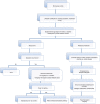Management of microscopic colitis: challenges and solutions
- PMID: 30881078
- PMCID: PMC6398419
- DOI: 10.2147/CEG.S165047
Management of microscopic colitis: challenges and solutions
Abstract
Microscopic colitis (MC) is a chronic inflammatory bowel disease characterized by nonbloody diarrhea in the setting of normal appearing colonic mucosa. MC has two main subtypes based on histopathologic features, collagenous colitis and lymphocytic colitis. Management of both subtypes is the same, with treatment goal of reducing the number of bowel movements and improving consistency. First-line treatment involves counseling the patient about decreasing their risk factors, like discontinuing smoking and avoiding medications with suspected association such as NSAIDs, proton pump inhibitor, ranitidine, and sertraline. Starting loperamide for immediate symptomatic relief is used as an adjunct to therapy with glucocorticoids. Budesonide is considered first-line treatment for MC given its favorable side effect profile and good efficacy, though relapse rates are high. Systemic glucocorticoids should be reserved to patients unable to take budesonide. In glucocorticoid refractory disease, medications that have been tried include cholestyramine, bismuth salicylate, antibiotics, probiotics, aminosalicylates, immunomodulators, and anti-tumor necrosis factor-alpha inhibitors. More research is needed for the creation of a systematic stepwise approach for relapsing and refractory disease.
Keywords: collagenous colitis; diarrhea; inflammatory colitis; lymphocytic colitis; management; microscopic colitis.
Conflict of interest statement
Disclosure The authors report no conflicts of interest in this work.
Figures
References
-
- Fernández-Bañares F, Casanova MJ, Arguedas Y, et al. Current concepts on microscopic colitis: evidence-based statements and recommendations of the Spanish microscopic colitis group. Aliment Pharmacol Ther. 2016;43(3):400–426. - PubMed
-
- Nguyen GC, Smalley WE, Vege SS, Carrasco-Labra A, Clinical Guidelines Committee American gastroenterological association Institute guideline on the medical management of microscopic colitis. Gastroenterology. 2016;150(1):242–246. - PubMed
-
- Tong J, Zheng Q, Zheng Q, Lo R, Shen J, Ran Z. Incidence, prevalence, and temporal trends of microscopic colitis: a systematic review and meta-analysis. Am J Gastroenterol. 2015;110(2):265–276. - PubMed
-
- Zabana Y, Ferrer C, Aceituno M, Salas A, Fernández-Bañares F. Advances for improved diagnosis of microscopic colitis in patients with chronic diarrhoea. Gastroenterol Hepatol. 2017;40(2):107–116. - PubMed
Publication types
LinkOut - more resources
Full Text Sources


